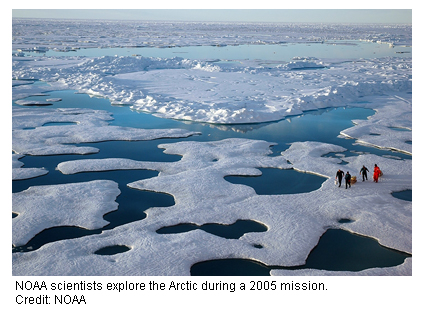
The following is a reprint of a news release posted by the US National Oceanic and Atmospheric Administration (NOAA) on Dec 1, 2011.
An international team of scientists who monitor the rapid changes in the Earth’s northern polar region say that the Arctic is entering a new state – one with warmer air and water temperatures, less summer sea ice and snow cover, and a changed ocean chemistry. This shift is also causing changes in the in the region’s life, both on land and in the sea, including less habitat for polar bears and walruses but increased access to feeding areas for whales.
Changes to the Arctic are chronicled annually in the Arctic Report Card, which was released today. The report is prepared by an international team of scientists from 14 different countries.
"This report, by a team of 121 scientists from around the globe, concludes that the Arctic region continues to warm, with less sea ice and greater green vegetation," said Monica Medina, NOAA principal deputy under secretary of commerce for oceans and atmosphere. "With a greener and warmer Arctic, more development is likely. Reports like this one help us to prepare for increasing demands on Arctic resources so that better decisions can be made about how to manage and protect these more valuable and increasingly available resources."
Among the 2011 highlights are:
In 2006, NOAA’s Climate Program Office introduced the State of the Arctic Report which established a baseline of conditions at the beginning of the 21st century. It is updated annually as the Arctic Report Card to monitor the often-quickly changing conditions in the Arctic. Peer-review of the scientific content of the report card was facilitated by the Arctic Monitoring and Assessment (AMAP) Program.
The Report Card tracks the Arctic atmosphere, sea ice, biology, ocean, land, and Greenland. This year, new sections were added, including, greenhouse gases, ozone and ultraviolet radiation, ocean acidification, Arctic Ocean primary productivity, and lake ice. To view the Arctic Report Card, visit http://www.arctic.noaa.gov/reportcard.
NOAA’s mission is to understand and predict changes in the Earth's environment, from the depths of the ocean to the surface of the sun, and to conserve and manage our coastal and marine resources. Visit www.noaa.gov or join us on Facebook, Twitter, and our other social media channels.
###
On the Web:
Arctic Report Card: http://www.arctic.noaa.gov/reportcard
NOAA’s Arctic Theme Page: http://www.arctic.noaa.gov
NOAA Arctic Research News: http://researchmatters.noaa.gov/news/Pages/Arctic.aspx
Posted by John Hartz on Monday, 19 December, 2011
 |
The Skeptical Science website by Skeptical Science is licensed under a Creative Commons Attribution 3.0 Unported License. |